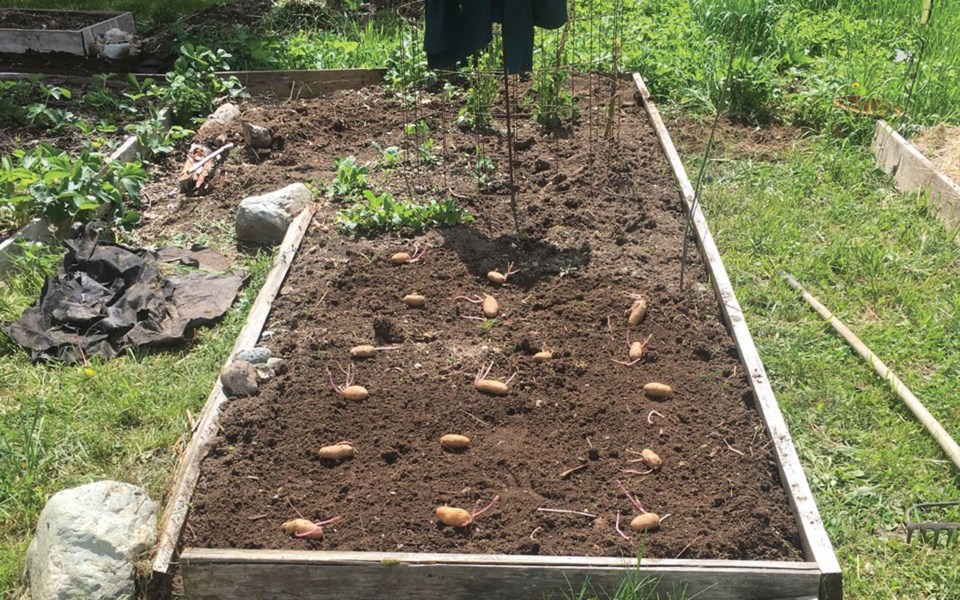For the past 10 weeks, I'd felt a low-level thrum of stress about the winter-mess of my garden. It would spike when I saw other people, in March, as the Prime Minster was giving his briefings in a snowstorm, who were pandemic-proofing their future by getting in loads of soil, going to physically distanced plant sales, posting pics of their seedlings, their brand-new garden beds. I was happy for them, of course. And happy for the idea that people would turn en masse to gardening. But I hated them, too.
That little frisson of envy and anxiety would perk up at the panic-buying of chickens and the video pleas from West Coast Seeds to "please be patient, we're experiencing unusual demand." I was working and parenting and re-orienting to life in isolation and trying to fit in the occasional mind-clearing walk in the woods.
All my garden time in March and April was single-mindedly devoted to weeding the strawberry patch, an epic battle that left me hallucinating invasive wiry grass root systems whenever I closed my eyes. It was a race against time to excavate the plants before they began to flower. It was a race against the seven-year-old's tolerance for solo play. It was a battle compounded by the sense that now everyone else in the world was jumping ahead of me, scooping up all the seeds, all the soil, on top of all the yeast, flour and toilet paper they'd already stockpiled. Oh, hello scarcity mindset, my pandemic dance partner. The things that matter most (stretches of uninterrupted time, kids for my son to play with, seeds, clarity about the future) all seemed in desperately short supply.
One afternoon while trail running, the sudden scent of cottonwood stopped me in my tracks. It was as if someone had spilled a jar of infused oil. I stopped and inhaled deeply, looking around for the source. "What?" I wondered. "What are you trying to tell me?"
It took a while for me to settle into listening mode, but when I finally did, the thought arose/the tree that I could smell but couldn't see, said: "When you work with us, you create the relationship that allows us to work with you."
I had recognized that scent because I had worked with cottonwood–gleaning buds back in the spring of 2019, packing them into a jar and pouring olive oil over them, tucking it in the pantry and shaking it when I remembered. A year later, I strained out the plant matter and poured the sticky oil into an old tin can, into which I chucked the leftover ends of a beeswax candle, warming it all up in a saucepan of water, to make a salve for aching muscles.
Had that quiet afternoon, working with my hands, my attention, and the invisible company of the half-dozen women who had introduced me to this tree over the past few years, also been a gateway into a deeper relationship with the tree species itself? Could it be that a tree was now suggesting to me, that by doing that, I was opening up a portal of reciprocity, a way in which the plant could now work with me, too?
Last weekend, I rolled up my sleeves and tackled the garden. As I cleared away mounds of last year's garden debris from one bed, feeling that little surge of overwhelm and inadequacy and the possibility of starvation should my family actually depend on these efforts, I thought back to my cottonwood-perfume-on-the-trail moment and wondered if maybe, I could just ask the garden nicely to be prolific this season to support us, and even possibly, to allow me to support other families. After all, as I turned up self-seeded carrots and cilantro and a bounty of worms, it seemed bent on sprouting forth with life, in spite of my neglect, my lack of mastery. Perhaps we could work together.
What if the Law of Nature is as simple and generous and sensible as this: Work with what you have. It will work with you.
Dr. Robin Wall Kimmerer, botanist, professor and the author of Braiding Sweetgrass: Indigenous Wisdom, Scientific Knowledge and the Teaching of Plants, asks her nature-loving students if they believe nature loves them back. They're always a bit insulted or shocked by the naivete of the question. They're scientists, after all.
Kimmerer writes, "How do I show my girls I love them on a morning in June? I pick them wild strawberries. We pick violets in May. How do we show our children our love? Each in our own way by a shower of gifts and a heavy rain of lessons. [Suddenly] I knew with a certainty as warm and clear as September sunshine—the land loves us back. She loves us with beans and tomatoes. By a shower of gifts and a heavy rain of lessons. She provides for us and teaches us to provide for ourselves. That's what good mothers do."
I will always compare my garden to other people's neater ones, the square angles, black soil, cute little labels, fancy trellises. Mine is chaotic and messy and imperfect. But it's working with me. I felt the sudden lift of that, and eased my trust into it. Some things will get eaten before I can harvest them, by deer or slugs or the kid. That's part of it. But into this unkempt, life-frothing patch of earth, I dropped my seeds and found a promise and a reminder: it's not all on my shoulders. It never ever is. All these beings and energies and life forms—the seeds, the wind, the rain, the worms—are working with me. Bringing me back, beckoning me (beckoning us all) back into relationship. Together, we might be OK. In fact, we might even flourish.
The Velocity Project: how to slow the f*&k down and still achieve optimum productivity and life happiness appears here when the author has words to share.




